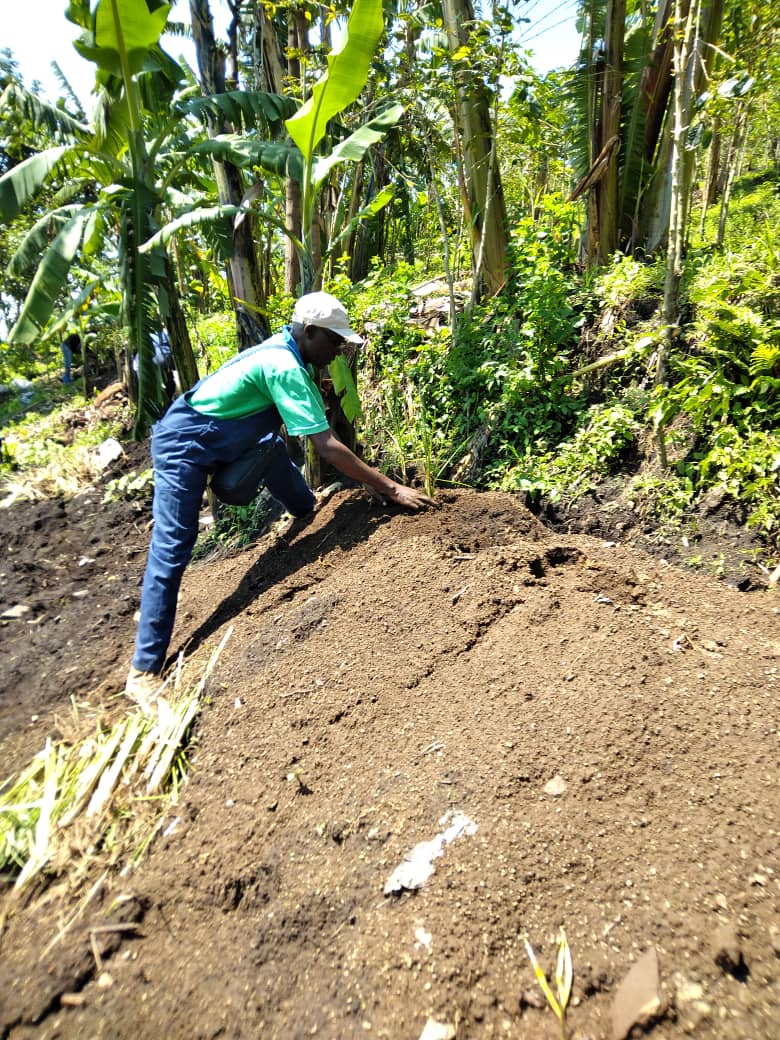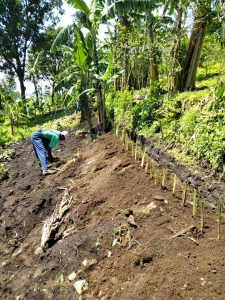
I wanted to extend a greeting to Achille and the great work he is doing in Goma, Rwanda on the shores of Lake Kivu. Permaculture techniques are being applied and Achille has the ambitions to create the Kivu, Regenerative Academy, I love the idea and the vision for this.
In his own words:
On this property, at my private initiative in 2006, started the project Bushengwa, training a promotion of 10 young people with various profiles (without access to school or not having the chance to end a cycle, in a difficult situation, former child soldiers demobilized from armed groups) and other peasants to organic farming. The results and achievements of this project gave birth to the project of the Agro-Ecological Farm School (FEAGE) at Mufumba in 2008 on a new land of about 7Ha in front of it, acquired with the support of Achilles’ friends and European partners. All of her cumulative positive experiences have finally given birth to the Association Villages Durables since 2010. It is this one that drives all the dynamics of peasant promotion starting from the FEAGE, considered as the linchpin of all its strategy to the profit village communities.
Current status of the project and perspectives.
Since 2015, I have started the conversion of this land, once considered unproductive by the local population into a fully permacultural site. It develops an orchard of citrus (orange, lemon, mandarin) mango, avocado, guava, banana, and arabica coffee; vegetable and food crops, and beekeeping. The idea is to erect gradually a center of retirement and training (training room, meeting, ecolodge suites and a campsite), resumption of breeding (cattle and poultry, etc).Apart from the family agroeconomic objective, one of the dream of the Kraal Lake Kivu is also to train through its Academy “Kivu Regenerative Academy” for trainings on applied permaculture and regenerative agriculture for all those who wish to learn sustainable farming methods that will allow them to create alternative livelihoods to the climate change and demographic challenges (in relation to the land issue) while raising awareness of global issues, by inviting young people, students and trainees, both regional and international.
This training also serves to develop the design of the site itself, because the practical elements of the course modules are mainly focused on the design or permaculture design of this site while providing an economic income to Kraal Lake Kivu as a family sustainable enterprise. Awareness and education programs for local communities are also envisaged, providing them with assistance in integrated permaculture techniques.
Kraal du Lac Kivu : Site Ecofamilial de Permaculture
Local context
In a local context that is both multi-stakeholder and multi-risk, climatic factors are not the only constraint to family farming activities, contrary to the arguments of the populations of the region. They consider that the situation they are going through to date is to be put on the back of climate disturbances alone. They do not hint at other factors related to changes in the physical environment.
And yet the worry comes down to:
• an agro-climatic memory that essentially incorporates the changes that have occurred over the last few years as well as possibly some older climatic events, notably the “Kahoro” (name given to a famine of the 1945’s) which has had a very significant impact on agricultural yields
• longer periods of drought and more and more random rainfall. Indeed, in recent years, episodes of drought coupled sometimes paroxysmal climatic phenomena (thunderstorms, tornadoes and hailstones followed by floods), more intense and more frequent, represent a real threat for agricultural yields which decrease significantly.
a) Local agriculture is also affected by climate change in addition to eco-degrading cultural practices with harmful environmental impacts: erosion, deforestation, etc. on the one hand a strong demographic pressure on the land and the disturbing phenomenon of land grabbing on the other hand.
b) The lack of regulation of the conditions of agricultural production coupled with the dumping of large stocks of chemical pesticides (pesticides and synthetic fertilizers) very toxic produced in China, India, Pakistan, Europe, USA (Monsanto) etc. with as a gateway the countries of East Africa (Uganda, Kenya, Tanzania …) is an important agro-environmental and human health risk in the Kivu region and eastern Democratic Republic of Congo. Indeed, companies from the above-mentioned countries that can no longer market some of their products because they have been banned for more than 25 years in the European Union, for example, are dumping their stocks in the region of the provinces bordering the EU. Eastern Democratic Republic of Congo (especially former Kivu and Ituri) is getting especially targeted since the Democratic Republic of Congo has still not legislated on these products.
c) Agricultural training structures unsuited to local specificities: need for proximity and pre- and post- installation monitoring. For more than 4 decades, the state has withdrawn from the training of young people and the supervision of farmers. Agricultural schools are particularly undersized and unsuitable. In fact, if training in agricultural practices is essential, post-training follow-up (installation, advice, etc.) is essential because disadvantaged populations do not have the means to follow a theoretical training while farmers are strongly influenced by advice from companies marketing chemical pesticides (use of pesticides and fertilizers synthetic pollutants) that guide agricultural techniques.
(These are the words of Achille Biffumbo – we post them here to raise the profile of this work and project.)






